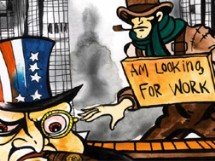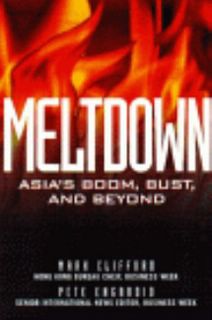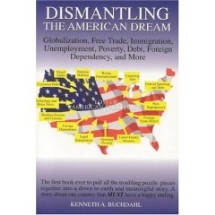The entire global financial structure is becoming uncontrollable in crucial ways its nominal leaders never expected. Instability is increasingly its hallmark….Contradictions now wrack the world’s financial system, and if we are to believe the institutions and personalities who have been in the forefront of the defense of capitalism, it may very well be on the verge of serious crisis.
Americans have dumped trillions of their hard-earned savings into risky hedge funds which have only been in existence for a short period of time. No one knows what the future holds for these “flash-in-the-pan” investments.
The credit derivative market was almost nonexistent in 2001, grew fairly slowly until 2004 and went into the stratosphere, reaching $17.3 trillion by the end of 2005.
That’s right; a whopping $17.3 trillion, enough to sink the entire economy if the market takes a nose dive.
This whole idea of re-selling debt is a relatively new phenomenon and fraught with peril. Hedge funds can bundle together a slew of Adjustable Rate Mortgages (ARMs) and make a handsome profit, but when the housing market starts listing, the investor is trapped on a sinking ship with little hope of recouping his losses.
Americans have dumped trillions of their hard-earned savings into risky hedge funds which have only been in existence for a short period of time. No one knows what the future holds for these “flash-in-the-pan” investments.
The credit derivative market was almost nonexistent in 2001, grew fairly slowly until 2004 and went into the stratosphere, reaching $17.3 trillion by the end of 2005.
That’s right; a whopping $17.3 trillion, enough to sink the entire economy if the market takes a nose dive.
This whole idea of re-selling debt is a relatively new phenomenon and fraught with peril. Hedge funds can bundle together a slew of Adjustable Rate Mortgages (ARMs) and make a handsome profit, but when the housing market starts listing, the investor is trapped on a sinking ship with little hope of recouping his losses.

"Deregulation"
Double Speak For Raising the Risk
Double Speak For Raising the Risk
Deregulation is characterized in the business-friendly media as a way of lifting the burdensome restrictions on the free flow of capital. This is nonsense. Deregulation is, in fact, the removal of the laws which traditionally protect the public from the hucksters and scam-artists who create lofty-sounding investments which are nothing more than Ponzi-schemes.
Deregulation has gravely undermined the long-term prospects for western capitalism to succeed. By removing the safeguards to investment, the business and banking communities have created what many call “casino capitalism,” an anarchic structure with few protections that is hurling the markets toward a system-wide meltdown.
Similar problems plague the sagging real estate market. In recent years a buyer could pick up a house with no down payment, an “interest-only” loan, a low ARM, and be reasonably certain that the next year it would increase 20 to 30% in value. This allows the buyer to refinance his home, use his “presto-equity” as discretionary income, and begin the cycle all over again next year.
With wages stagnating since the 1970s, the increase in home equity has been the preferred method for most Americans to “get ahead”. Housing prices have steadily increased since the 1980s and skyrocketed in the last 5 years. This has created a feeding-frenzy for low interest loans and attracted millions of speculators and (traditionally) unqualified applicants to the real estate gold rush.
It’s been a great deal for the banks, too. Mortgages make up the bulk of the bank loans in America, more than $400 billion last year alone. If it wasn’t for the steady stream of mortgages many banks would have seen negative growth in the last decade.
Deregulation has gravely undermined the long-term prospects for western capitalism to succeed. By removing the safeguards to investment, the business and banking communities have created what many call “casino capitalism,” an anarchic structure with few protections that is hurling the markets toward a system-wide meltdown.
Similar problems plague the sagging real estate market. In recent years a buyer could pick up a house with no down payment, an “interest-only” loan, a low ARM, and be reasonably certain that the next year it would increase 20 to 30% in value. This allows the buyer to refinance his home, use his “presto-equity” as discretionary income, and begin the cycle all over again next year.
With wages stagnating since the 1970s, the increase in home equity has been the preferred method for most Americans to “get ahead”. Housing prices have steadily increased since the 1980s and skyrocketed in the last 5 years. This has created a feeding-frenzy for low interest loans and attracted millions of speculators and (traditionally) unqualified applicants to the real estate gold rush.
It’s been a great deal for the banks, too. Mortgages make up the bulk of the bank loans in America, more than $400 billion last year alone. If it wasn’t for the steady stream of mortgages many banks would have seen negative growth in the last decade.

Now that housing prices are flattening out and expected to fall (precipitously) the easy money has dried up and many over-leveraged homeowners are facing the dismal prospect of having to pay off an asset that is quickly losing its value. Economist Michael Hudson calls this phenomenon “negative equity”, that is, when the current value of the house falls beneath the amount that one has to pay on his mortgage. It is a predicament which now faces an estimated 30 million Americans who are drowning in red ink and skittering towards a life of indentured servitude.
The magnitude of the housing bubble is shocking and unprecedented. According to the Federal Reserves own figures, “The total amount of residential housing wealth in the US just about doubled between 1999 and 2006 up from $10.4 trillion to $20.4 trillion.”
(Times Online) This tells us that the Fed had a clear idea of the size of the equity balloon their low interest policies were creating, but decided not to take corrective action. It also tells us that there will be no “soft landing”.
When the market begins to fall, no one knows when it will hit bottom. $10 trillion is more than a “little froth”, as Greenspan opined; it is an earth-shaking, economy-busting catastrophe that will put millions at risk of foreclosure, bankruptcy and ruin.
The magnitude of the housing bubble is shocking and unprecedented. According to the Federal Reserves own figures, “The total amount of residential housing wealth in the US just about doubled between 1999 and 2006 up from $10.4 trillion to $20.4 trillion.”
(Times Online) This tells us that the Fed had a clear idea of the size of the equity balloon their low interest policies were creating, but decided not to take corrective action. It also tells us that there will be no “soft landing”.
When the market begins to fall, no one knows when it will hit bottom. $10 trillion is more than a “little froth”, as Greenspan opined; it is an earth-shaking, economy-busting catastrophe that will put millions at risk of foreclosure, bankruptcy and ruin.
The Real American Unemployment Rate
The unemployment rate in the U.S. is misleading. It only shows people looking for work, not people who have given up looking or are off unemployment benefits. Include these people in the unemployment rate!
The real unemployment rate is 23%
The real unemployment rate is 23%
The federal government claims the unemployment rate hovers around 5.5% But the government’s “unemployment rate” statistic is a propaganda device. It does not count as “unemployed” people who are “not in the labor force.”
According to economist Richard DuBoff, participation in the labor force by working-age males has been drifting downward for more than 40 years. Therefore, the government’s official “unemployment rate” is an increasingly misleading statistic.
According to economist Richard DuBoff, participation in the labor force by working-age males has been drifting downward for more than 40 years. Therefore, the government’s official “unemployment rate” is an increasingly misleading statistic.
*According to the government’s own statistics, the civilian non-institutional population of United States males, age 16 and over, was 107.7 million people. Of those 107.7 million males, 14.7 million were estimated to be age 65 or over. Therefore, the number of men between 16 and 64, which traditionally constitutes this nation’s workforce, was 93 million.
Of those 93 million men, the government admits that 4.4 million of them are unemployed. And when I say unemployed, I mean utterly and completely inactive. The government considers someone “employed” if they work as little as one hour a week. People who do not even work one hour a week are still considered “employed” if they are “temporarily absent” from work.
But in addition to the 4.4 million men who are officially “unemployed” the government admits that 28.7 million men over 16 are “not in the labor force.” Subtracting from this 28.7 million the estimated 11.9 million men 65 and over belonging to that group, results in 16.8 million men between the ages of 16 and 64 who are “not in the labor force.”
Adding the 4.4 million officially unemployed to the 16.8 million who are factually unemployed yields a total of 21.2 million unemployed men between the ages of 16 and 64.
These 21.2 million unemployed men of working age represent almost 23% of the 93 million working age men in the United States.
But in addition to the 4.4 million men who are officially “unemployed” the government admits that 28.7 million men over 16 are “not in the labor force.” Subtracting from this 28.7 million the estimated 11.9 million men 65 and over belonging to that group, results in 16.8 million men between the ages of 16 and 64 who are “not in the labor force.”
Adding the 4.4 million officially unemployed to the 16.8 million who are factually unemployed yields a total of 21.2 million unemployed men between the ages of 16 and 64.
These 21.2 million unemployed men of working age represent almost 23% of the 93 million working age men in the United States.
The Sinking of American Labor
Americans are facing new kinds of poverty and unemployment. Previously, poverty and unemployment in America were more or less cyclical. Today, they are becoming permanent structural features of this society.
A whole new social class of people is being created here - people whose labor is simply no longer needed in the economy because of technological change. Economic productivity has created a large, permanent class of those whom society cannot use and does not respect.
While the experts predict a glowing future for those maximum twenty percent of the U.S. population who will earn their bread by manipulating information in highly specialized ways, they are silent about prospects for the remaining eighty percent.
The United States has already become a society with a obscenely prosperous minority at the top, a downwardly mobile working class in the middle, and a marginalized so-called "underclass" at the bottom.
A whole new social class of people is being created here - people whose labor is simply no longer needed in the economy because of technological change. Economic productivity has created a large, permanent class of those whom society cannot use and does not respect.
While the experts predict a glowing future for those maximum twenty percent of the U.S. population who will earn their bread by manipulating information in highly specialized ways, they are silent about prospects for the remaining eighty percent.
The United States has already become a society with a obscenely prosperous minority at the top, a downwardly mobile working class in the middle, and a marginalized so-called "underclass" at the bottom.
References ...
*Made In the U S A not
*The Great Unemployment Cover-up and the Looting of America
1. Federal Trade Policy
2. Federal Monetary Policy
3. Federal Immigration Policy
4. Federal Antitrust Policy
5. Federal Tax Policy
6. Federal Environmental Policy
It’s looking like he overestimated us.
Is it a coincidence that elites are moving the productive capacity of the United States?
Frontlines
U.S. Trade Policy and Job-Destroying Treaties, WTO & NAFTA
No Jobs for Middle Class
Nine 2 Five: The Other Side [DCTV Youth]
Originally Posted on Thursday, March 27, 2008
Technocrati tags:Economic Meltdown, Debt, Hedge funds, Adjustable Rate Mortgages, Deregulation, Mortgages, Housing Prices, Housing Bubble, Unemployment, Meltdown, Outsourcing, Jobs, Underclass
*Made In the U S A not
*The Great Unemployment Cover-up and the Looting of America
Profits of Doom
In a paper he prepared for a recent Federal Reserve Bank of Boston conference, Richard Freeman, a Harvard labor economist, estimates that the entry of China, India and the former Soviet bloc roughly doubled the number of workers in the market economy, from 1.46 billion to 2.93 billion.
Since those countries brought little capital with them, the number of workers in the system shot up while the amount of capital increased very little. As the law of supply and demand might suggest, when labor is abundant and capital scarce, the returns to labour tend to fall and those to capital rise.
In addition, the idea that only low-skilled factory workers have anything to fear from globalization has turned out to be a myth. The former Soviet bloc already has many highly educated workers (the Soviets, remember, beat the Americans into space) and the less developed countries are pouring investment into higher education.
“Indonesia, Brazil, China, India - name the country - have more than doubled university student enrollments in the 1980s and 1990s,” Freeman says. China is investing particularly heavily in science and engineering and “by 2010 it will graduate more PhDs in science and engineering than the US”.
... the developing world has inconveniently departed from the script that said it would specialize in low-tech goods. “China has moved rapidly up the technological ladder, has greatly increased its high-tech exports and has achieved a significant position in research in what is purported to be the next big industrial technology - nanotechnology,” Freeman says. “Over 750 multinational firms have set up R&D facilities in China.”
So globalization is not just about a few blue-collar factory workers in the west losing their jobs and everyone else being better off. Because of plummeting telecom charges, all kinds of middle-class, white-collar jobs once thought of as non-tradeable - not just in telemarketing and call centers but in accountancy, medical diagnostics and information technology - have started moving to the developing world.
“Firms threaten to move facilities to lower-wage settings or to import products made by low-wage workers if their current workforce does not accept lower wages or working conditions, to which there is no strong labour response,” Freeman says.
“We are in the process of creating a global market without a global social contract.” We take it for granted that the west must have its child labour laws, workplace safety regulations and so on, but in the global market, no such rules apply.
Since those countries brought little capital with them, the number of workers in the system shot up while the amount of capital increased very little. As the law of supply and demand might suggest, when labor is abundant and capital scarce, the returns to labour tend to fall and those to capital rise.
In addition, the idea that only low-skilled factory workers have anything to fear from globalization has turned out to be a myth. The former Soviet bloc already has many highly educated workers (the Soviets, remember, beat the Americans into space) and the less developed countries are pouring investment into higher education.
“Indonesia, Brazil, China, India - name the country - have more than doubled university student enrollments in the 1980s and 1990s,” Freeman says. China is investing particularly heavily in science and engineering and “by 2010 it will graduate more PhDs in science and engineering than the US”.
... the developing world has inconveniently departed from the script that said it would specialize in low-tech goods. “China has moved rapidly up the technological ladder, has greatly increased its high-tech exports and has achieved a significant position in research in what is purported to be the next big industrial technology - nanotechnology,” Freeman says. “Over 750 multinational firms have set up R&D facilities in China.”
So globalization is not just about a few blue-collar factory workers in the west losing their jobs and everyone else being better off. Because of plummeting telecom charges, all kinds of middle-class, white-collar jobs once thought of as non-tradeable - not just in telemarketing and call centers but in accountancy, medical diagnostics and information technology - have started moving to the developing world.
“Firms threaten to move facilities to lower-wage settings or to import products made by low-wage workers if their current workforce does not accept lower wages or working conditions, to which there is no strong labour response,” Freeman says.
“We are in the process of creating a global market without a global social contract.” We take it for granted that the west must have its child labour laws, workplace safety regulations and so on, but in the global market, no such rules apply.
Outsourcing videos
(Check out these videos)
*Exporting America's Future
*Why Outsourcing
*Asia Outsourcing
*Latin America Outsourcing
*Global Outsourcing
*Global Partnership for Outsourcing
*Is Outsourcing Profitable
*Andy Rooney's Take Outsourcing
(Check out these videos)
*Exporting America's Future
*Why Outsourcing
*Asia Outsourcing
*Latin America Outsourcing
*Global Outsourcing
*Global Partnership for Outsourcing
*Is Outsourcing Profitable
*Andy Rooney's Take Outsourcing
How jobs are vanishing from America
The real rate of unemployment in the United States is the product of conscious planning. That planning is demonstrated by an intelligent coordination of various federal government policies. Most of these policies have been implemented in the last twenty-five years. These policies can be summarized as follows:
1. Federal Trade Policy
Starting with NAFTA and continuing with the General Agreement of Tariffs and Trade, the federal government began to eliminate tariffs on imports. Without the tariffs, prices for imports manufactured with cheaper foreign labor undercut prices for products that were made in America. In order to compete, America’s manufacturers had to lay off American workers and hire workers in foreign countries. They did.
2. Federal Monetary Policy
American workers could still make many products that were superior to those made by foreign workers. If foreigners could afford to buy them, American workers would keep their jobs.
But foreigners couldn’t afford to buy American made products if the American dollar remained overvalued compared to other countries’ currencies.
Since first taking office in 1987, Federal Reserve Chairman Alan Greenspan’s “strong dollar policy” overvalued the dollar relative to other nations’ currencies, especially that of Red China’s.
So, even without tariffs, most foreigners can’t afford to buy goods made in America.
But foreigners couldn’t afford to buy American made products if the American dollar remained overvalued compared to other countries’ currencies.
Since first taking office in 1987, Federal Reserve Chairman Alan Greenspan’s “strong dollar policy” overvalued the dollar relative to other nations’ currencies, especially that of Red China’s.
So, even without tariffs, most foreigners can’t afford to buy goods made in America.
3. Federal Immigration Policy
If the federal government didn’t allow massive legal and illegal immigration from Third World countries, there would be more and higher-paying jobs for American citizens.
But the federal government did decide to allow mass immigration, and there aren’t more or higher paying jobs for American citizens.
But the federal government did decide to allow mass immigration, and there aren’t more or higher paying jobs for American citizens.
4. Federal Antitrust Policy
If the federal government enforced the antitrust laws so that American companies couldn’t consolidate using “mega-mergers”, those companies would still have to compete against each other. In order to compete against each other, each company would have to hire American workers. In order to compete for workers, the companies would have to pay higher wages and salaries.
But the Republicrats seldom enforce antitrust laws. The Department of Justice (sic) routinely approves mega-mergers, knowing that the whole point of the merger is to increase profits by laying off workers.
But the Republicrats seldom enforce antitrust laws. The Department of Justice (sic) routinely approves mega-mergers, knowing that the whole point of the merger is to increase profits by laying off workers.
5. Federal Tax Policy
The more you tax something, the less of it you get. The federal government collects Social Security payroll taxes from American employers who hire American employees. Over the past twenty-five years, those taxes have doubled. The federal government is planning a further a increase in payroll taxes, supposedly to “save social security.” The real effect will be spur American employers to outsource jobs to foreign countries.
6. Federal Environmental Policy
Federal environmental policies are shutting down land-based production in the United States. This means a reduction in the number of jobs available in those sectors of the economy: farming, logging, mining, etc.
Shift In Economic Power
On the economic plane, realising that economies of scale matter, particularly as sources of consumer markets, countries will gravitate towards the formation of larger trading blocs. In particular Europe will gravitate towards a bigger trading bloc which will include much of Eastern Europe; North and South America will become much more integrated; and Asia will also move towards a much more unified economic bloc.
A shift in economic power from the western world, where it has resided for the past 300 years, to the east, particularly India and China, where over 40% of humanity reside. This shift in economic power will invariably be immediately followed by a shift in political power. This shift in economic and political powers from the west to the east will have many consequences.
The 21st century is an interesting century in the sense that humanity will be able to create machines that will ultimately perform - without much human intervention - tasks that are traditionally performed by human beings. This process is called automation.
It can therefore be expected that machines, without any human intervention, will manufacture an entire car on a much larger scale than is presently the case. The effect of this on the labor market, and in particular on unemployment, will be far reaching.
A shift in economic power from the western world, where it has resided for the past 300 years, to the east, particularly India and China, where over 40% of humanity reside. This shift in economic power will invariably be immediately followed by a shift in political power. This shift in economic and political powers from the west to the east will have many consequences.
The 21st century is an interesting century in the sense that humanity will be able to create machines that will ultimately perform - without much human intervention - tasks that are traditionally performed by human beings. This process is called automation.
It can therefore be expected that machines, without any human intervention, will manufacture an entire car on a much larger scale than is presently the case. The effect of this on the labor market, and in particular on unemployment, will be far reaching.
Simply put, those with enough capital to acquire this capacity *will ultimately control economies of scale without much participation of the masses of people. This will ensure that the fundamental rule of international capitalist economy that says that the gap between the rich and the poor keeps widening will intensely govern societies unless there is a major shift towards socially oriented societies.
Why jobs are vanishing from America
Public opinion polls routinely report that the dearth of jobs is the number one issue among voters.
The Republicrats are keenly aware that jobs are vanishing from America. They want us to think they are doing something about it. The Congress recently granted a tax amnesty to multinational corporations, but decided to call it the “Jobs Creation Act.”
But in fact, as the foregoing demonstrates, the Republicrats are doing everything possible to undermine work opportunities for American citizens. Why?
As is obvious for most of us, the Republicrats no longer represent the interests of American citizens. The reelection rate for Congressional incumbents hovers around 98%. Incumbents have a huge advantage because they are in a position to solicit bribes.
Republicrats take their orders from a global elite that bankrolls their perpetual reelection. Having fewer and lower paying jobs in America serves a number of items on that elite’s agenda. That agenda revolves around creating the conditions for global government.
The Republicrats are keenly aware that jobs are vanishing from America. They want us to think they are doing something about it. The Congress recently granted a tax amnesty to multinational corporations, but decided to call it the “Jobs Creation Act.”
But in fact, as the foregoing demonstrates, the Republicrats are doing everything possible to undermine work opportunities for American citizens. Why?
As is obvious for most of us, the Republicrats no longer represent the interests of American citizens. The reelection rate for Congressional incumbents hovers around 98%. Incumbents have a huge advantage because they are in a position to solicit bribes.
Republicrats take their orders from a global elite that bankrolls their perpetual reelection. Having fewer and lower paying jobs in America serves a number of items on that elite’s agenda. That agenda revolves around creating the conditions for global government.
FEWER JOBS=LOWER STANDARD OF LIVING
Obviously, fewer and lower paying jobs for Americans will result in Americans having a lower standard of living.
Elites believe that a uniform standard of living for all the peoples of the world is a precondition to global government.
This goal requires that countries with lower standards of living be raised and that countries with higher standards of living be lowered.
After W.W.II, the United States had the highest standard of living in the world. In order to make global living standards uniform, the American standard of living has to be lowered.
Some find it hard to believe that government is trying to lower the standard of living. Yet the idea of equalizing national standards of living was being discussed almost sixty years ago.
Back in 1947, the great Austrian economist Friedrich von Hayek expressed skepticism about the “great deal of muddleheaded talk about planning to equalize standards of life” throughout the world.
Von Hayek, who won a Nobel prize in 1974, scoffed at the notion that ”European races would voluntarily submit to their standard of life and rate of progress being determined by a World Parliament.”
Elites believe that a uniform standard of living for all the peoples of the world is a precondition to global government.
This goal requires that countries with lower standards of living be raised and that countries with higher standards of living be lowered.
After W.W.II, the United States had the highest standard of living in the world. In order to make global living standards uniform, the American standard of living has to be lowered.
Some find it hard to believe that government is trying to lower the standard of living. Yet the idea of equalizing national standards of living was being discussed almost sixty years ago.
Back in 1947, the great Austrian economist Friedrich von Hayek expressed skepticism about the “great deal of muddleheaded talk about planning to equalize standards of life” throughout the world.
Von Hayek, who won a Nobel prize in 1974, scoffed at the notion that ”European races would voluntarily submit to their standard of life and rate of progress being determined by a World Parliament.”
It’s looking like he overestimated us.
Europe Will Lead
Europe has what I call "transformative power," the power to change countries from within. First of all, the EU is not a superstate or an empire; it’s a sort of decentralized club. It has developed the biggest single market in the world, and it can offer other countries trade and aid and all the carrots that major powers have been able to dangle in the past.
Secondly, the EU projects power not by threatening to invade other countries but by threatening to exclude them from its benefits—either from being members of the club or from being engaged with the club in some way.
And thirdly, the power of the EU is embedded in law. To join the European club you have to adopt 80,000 pages of laws, stored in 34 volumes, which govern everything from human rights and the protection of minorities to the composition of tomato ketchup. And that sort of legal power allows you to transform not just the regimes in other countries but the whole of their societies.
Secondly, the EU projects power not by threatening to invade other countries but by threatening to exclude them from its benefits—either from being members of the club or from being engaged with the club in some way.
And thirdly, the power of the EU is embedded in law. To join the European club you have to adopt 80,000 pages of laws, stored in 34 volumes, which govern everything from human rights and the protection of minorities to the composition of tomato ketchup. And that sort of legal power allows you to transform not just the regimes in other countries but the whole of their societies.
Elites realize that unemployment lowers the birthrate. Younger people who are jobless believe they can’t afford to have children. So they don’t.
For example, the European nations with the highest youth unemployment rates also have *the lowest birthrates. A recent study concluded that Australia’s perilously low birth rate was caused by fear of unemployment.
For example, the European nations with the highest youth unemployment rates also have *the lowest birthrates. A recent study concluded that Australia’s perilously low birth rate was caused by fear of unemployment.
Lowering the birthrate in the nations of Europe and North America has been a primary objective of elite planners since the end of W.W.II. This depopulation imperative accounts for their coordinated and intense effort to legalize abortion and homosexuality in those countries.
In countries that have higher standards of living, lowering the birthrate reduces the number of people who are born into that higher standard of living. That makes it easier for elites to equalize standards of living around the world, since there are relatively fewer people whose standard of living needs to be lowered.
The jobs that are vanishing from America do not disappear. Most of them are being moved to China and India, two nations on track to become the political and economic powers of the 21st Century.
In countries that have higher standards of living, lowering the birthrate reduces the number of people who are born into that higher standard of living. That makes it easier for elites to equalize standards of living around the world, since there are relatively fewer people whose standard of living needs to be lowered.
The jobs that are vanishing from America do not disappear. Most of them are being moved to China and India, two nations on track to become the political and economic powers of the 21st Century.
Is it a coincidence that elites are moving the productive capacity of the United States?
Conclusion
More than just American jobs is at stake. Global elites and their federal government lackeys are doing everything possible to destroy America.
For any part of our nation to be salvaged, we will have to abandon “politics as usual” and prepare to fight and survive.
For any part of our nation to be salvaged, we will have to abandon “politics as usual” and prepare to fight and survive.
Frontlines
U.S. Trade Policy and Job-Destroying Treaties, WTO & NAFTA
No Jobs for Middle Class
Nine 2 Five: The Other Side [DCTV Youth]
Originally Posted on Thursday, March 27, 2008
Technocrati tags:Economic Meltdown, Debt, Hedge funds, Adjustable Rate Mortgages, Deregulation, Mortgages, Housing Prices, Housing Bubble, Unemployment, Meltdown, Outsourcing, Jobs, Underclass























1 comment:
We now have an "a penny saved is a penny earned economy". Spending is all that will revive our economy. I think we have two conflictatory realities who's sum spells doom and depression. Capitalism has been a failure yet the benefits of socialism are taboo to most americans. They choose to strangle themselves with their own ideologies................What is wrong with capitalism tempered with a healthy dose of socialism. Hybrids are appreciated by all in fruits and vegetables. It appears as if tunnel vissioned idealogy has the American public in a strangle hold by it's own hand.
Post a Comment